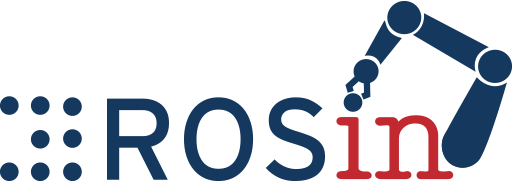About ROS, ROS-I and ROSIN.
ROS, the Robot Operating System, is arguably the most widely adopted Open Source Software stack by today’s robot builders. It can be commonly found in service robots and drones, among the others. ROS also has the potential to be of great value to industrial robotics and automation as a vehicle for the main traits of Open Source – collaborative design, and a broad and diverse community of users and developers – within robotics.
ROS-Industrial was founded in 2012 to apply the Open Source approach to Factory Automation through ROS, and it has successfully grown to a worldwide initiative supported by three regional Consortia. ROSIN, a project funded by the European Union’s Horizon 2020 research and innovation programme under grant agreement No 732287, aims to amplify its impact by refining ROS-Industrial and making it even more business-friendly and accessible. The broader the ROS-Industrial community and the higher its engagement in actively using and further developing it, the more business-relevant, and hence successful, the platform will be. For this reason, a considerable part of ROSIN’s budget is reserved for co-financing Focused Technical Projects (FTPs) and Educational Projects (EPs).
About IAAC Educational Project for ROSIN :
IAAC’s project “Teaching ROS for the construction industry” aims at making ROS technology accessible for the construction industry by supporting emerging educational formats for applied robotics. In particular, the project will provide a space setup, hardware components, custom software and teaching content, to support the use of ROS in the Master in Robotics and Advanced Construction (MRAC) at the Institute of Advanced Architecture of Catalonia (IAAC). Once refined, the results of the project will be then released in open source licence to the community, in the form of an open-source plugin compatible with software used in the construction industry (such as Rhinoceros 3D or Revit).
About MRAC
The Master in Robotics and Advanced Construction (MRAC) at IaaC addresses emerging challenges for architects, engineers and designers to propose novel technological solutions for the built environment. The agenda of this program aims to digitize multiple stages from design, manufacturing to on-site operations, with the goal to cognify machines, making them capable of perceiving their environment and accomplish complex tasks with real-time sensor feedback. In this program, ROS technologies allow students to define innovative protocols of information, building a robotic network of applications sharing data, sending and receiving instructions, communicating in a distributed network and operating in a much wider context of interaction.


